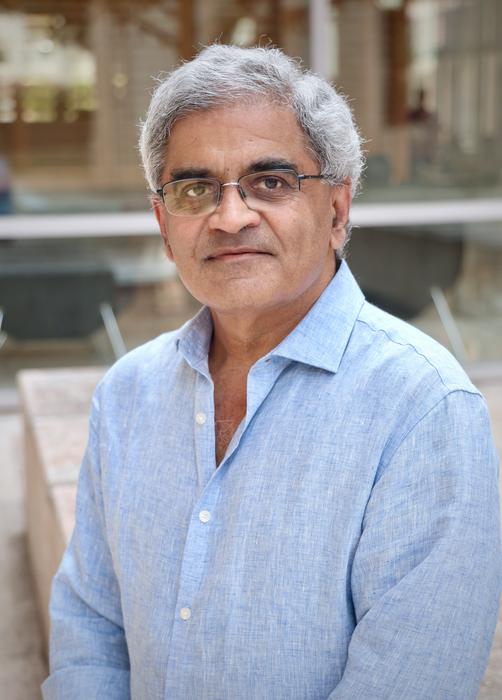ACM, the Association for Computing Machinery, and IEEE Computer Society have named Keshav Pingali, the W.A.”Tex” Moncrief Chair of Grid and Distributed Computing at the University of Texas at Austin, as the recipient of the 2023 ACM-IEEE CS Ken Kennedy Award. The Ken Kennedy Award recognizes groundbreaking achievements in parallel and high performance computing. Pingali is cited for contributions to high-performance parallel computing for irregular algorithms such as graph algorithms. He is also cited for leadership on the Galois Project, which provides a unifying framework for parallelizing both irregular and regular algorithms.

Credit: Association for Computing Machinery
ACM, the Association for Computing Machinery, and IEEE Computer Society have named Keshav Pingali, the W.A.”Tex” Moncrief Chair of Grid and Distributed Computing at the University of Texas at Austin, as the recipient of the 2023 ACM-IEEE CS Ken Kennedy Award. The Ken Kennedy Award recognizes groundbreaking achievements in parallel and high performance computing. Pingali is cited for contributions to high-performance parallel computing for irregular algorithms such as graph algorithms. He is also cited for leadership on the Galois Project, which provides a unifying framework for parallelizing both irregular and regular algorithms.
Pingali has made deep and wide-ranging contributions to many areas of parallel computing including programming languages, compilers, and runtime systems for multicore, manycore and distributed computers. These include program transformation algorithms for cache optimization, representations for program restructuring, and symbolic analysis techniques for complex numerical algorithms. These contributions have been incorporated into most open-source and commercial compilers.
Pingali’s most recent research has focused on foundational parallel programming abstractions and implementations for irregular algorithms, which use complex data structures like sparse matrices and graphs. Traditional techniques for exploiting parallelism in regular dense matrix algorithms fail when applied to irregular algorithms. The Ken Kennedy award recognizes Pingali’s “operator formulation of algorithms,” which is a programming and execution model that is remarkably simple yet powerful enough to capture patterns of parallelism in both regular and irregular algorithms. The Galois system implements this model, and it is used in diverse areas including real-time intrusion detection in computer networks, parallel tools for asynchronous circuit design, and machine learning on graphs for drug discovery. In addition, Pingali is being recognized for his distinguished mentoring of computer science leaders and students during his career.
Biographical Background
Keshav Pingali is the William “Tex” Moncrief Chair of Grid and Distributed Computing at the University of Texas at Austin. Before moving to UT Austin, Pingali was the India Chair of Computing in the Department of Computer Science at Cornell University. Pingali received the Bachelor of Technology (B.Tech) degree from the Indian Institute of Technology, Kanpur, where he was awarded the President’s Gold Medal; the Master of Science (S.M.) and Electrical Engineering (E.E.) degrees from the Massachusetts Institute of Technology; and a Doctor of Science (ScD) degree from the Massachusetts Institute of Technology.
He is a Fellow of the American Association for the Advancement of Science (AAAS), the Association for Computing Machinery (ACM), the Institute of Electrical and Electronics Engineers (IEEE), a Foreign Member of the Academia Europaea, and a Distinguished Alumnus of the Indian Institute of Technology, Kanpur. In March 2023, he was awarded the IEEE Charles Babbage award. In 1998, the College of Arts & Sciences at Cornell University awarded him the Stephen & Margery Russell Distinguished Teaching for “superlative performance in the classroom.” He has served on the NSF CISE Advisory Committee (2009-2012), and he was co-Editor-in-Chief of the ACM Transactions on Programming Languages and Systems (2007-2010).
The award will be formally presented to Pingali in November at The International Conference for High Performance Computing, Networking, Storage and Analysis (SC23).
About the Ken Kennedy Award
ACM and IEEE CS co-sponsor the Kennedy Award, which was established in 2009 to recognize substantial contributions to programmability and productivity in computing and significant community service or mentoring contributions. It was named for the late Ken Kennedy, founder of Rice University’s computer science program and a world expert on high performance computing. The Kennedy Award carries a US $5,000 honorarium endowed by IEEE CS and ACM.
About ACM
ACM, the Association for Computing Machinery, is the world’s largest educational and scientific computing society, uniting computing educators, researchers, and professionals to inspire dialogue, share resources and address the field’s challenges. ACM strengthens the computing profession’s collective voice through strong leadership, promotion of the highest standards, and recognition of technical excellence. ACM supports the professional growth of its members by providing opportunities for life-long learning, career development, and professional networking.
# # #



